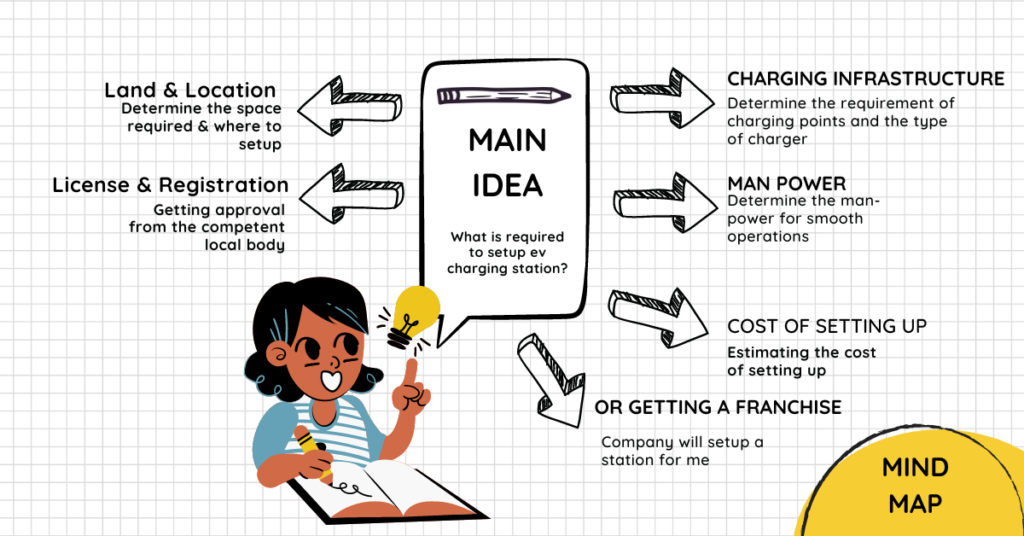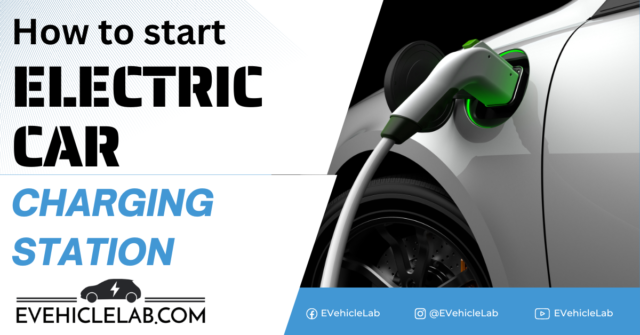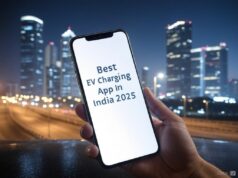The Indian government has set an ambitious target of achieving 30% EV penetration by 2030, which will lead to a massive demand for EV charging stations. Moreover, the cost of setting up an EV charging station is relatively low compared to other countries, making it an attractive investment opportunity.
In this article, we will discuss how can you set up an EV charging station in India, including the requirements, regulations, infrastructure, revenue models, and the best EV charging station dealerships in India.
What is required to set up an EV charging Station?

Let’s start from the start…
1. Determining the LAND Required
Estimating the land required for a charging station is not that much easy, but here we’ve added some important tips as a bonus that will help you to determine the amount of land required. Here are some steps you can take to estimate the land requirements for setting up an electric car charging station:
Determine the number of charging points you want to install: This will depend on the expected demand in the area, the type of charging station you plan to install, and your budget.
Select the type of charging station:
| Type of Charging Station | Voltage | Suitable for | Location |
|---|---|---|---|
| Level 1 | 120V | Home use | Residential areas |
| Level 2 | 240V | Public or workplace charging | Public areas, workplaces, parking lots |
| DC Fast Charging | High voltage | High-traffic areas | Highways, rest stops, commercial areas |
Calculate the parking space required: The amount of parking space required will depend on the number of charging points, the type of charging station, and the expected demand. Level 1 and Level 2 chargers require one parking space per charging point, while DC Fast Charging stations may require two or more parking spaces per charging point.
Consult with local authorities: Before starting the installation process, it is important to consult with local authorities to ensure compliance with zoning and other regulations.
In summary, the land required to set up an electric car charging station will depend on the number of charging points, the type of charging stations, and the available parking space. It is important to carefully evaluate these factors to ensure the success of the charging station.
After determining the land amount, choosing the right location plays a vital role in the success of a charging station.
2. Choosing the Right Location
The charging station should be easily accessible to EV owners and strategically located in a place with high footfall, such as malls, parking lots, and commercial areas.
When deciding where to put an EV (Electric Vehicle) charging station, there are a few factors to consider:
Accessibility: The charging station should be easily accessible to electric vehicle owners, preferably in a visible and convenient location.
Power supply: The charging station will need to be connected to a power supply that can handle the required voltage and amperage for the charger.
Parking availability: The charging station should be located in an area with adequate parking for electric vehicles, and should not obstruct other vehicles or pedestrians.
Based on these factors, some common locations for EV charging stations include:
- Public parking lots and garages
- Shopping centers and malls
- Gas stations and convenience stores
- Office and workplace parking lots
- Multi-family residential buildings and apartment complexes
- High-traffic areas such as tourist attractions, airports, and train stations.
Ultimately, the location of an EV charging station will depend on the specific needs and preferences of the electric vehicle owner or the organization installing the charging station.
3. Charging Infrastructure
In this section, you have to determine the number of charging points and the necessary equipment required.
There are several types of charging equipment that may be required for an EV charging station, depending on the specific needs and requirements of the station including EV chargers, charging cables, Charging Station Enclosure, Network Connectivity, Payment Systems, Energy Management Systems, and Site Preparation.
Different types of EV Chargers
| S. No | Charging Station | Voltage (V) | Power (kW) | Type of Vehicle | Type of compatible charger |
| 1 | Level 1 (AC) | 240 | <=3.5 kW | 4w ,3w,2w | Type 1, Bharat AC-001 |
| 2 | Level 1 (DC) | >=48 | <=15 kW | 4w,3w,2w | Bharat DC-001 |
| 3 | Level 2 (AC) | 380-400 | <=22 kW | 4w,3w,2w | Type 1, Type 2, GB/T, Bharat AC-001 |
| 4 | Level 3 (AC) | 200-1000 | 22 to 4.3 kW | 4w | Type 2 |
| 5 | Level 3 (DC) | 200-1000 | Up to 400 kW | 4w | Type 2, CHAdeMO,CCS1,CCS2 |
4. License & Registration
The Indian government has concluded that no license is required to build charging infrastructure as long as it meets the ‘Ministry of Power standards. As a result, there is no need for special permission to transmit, distribute, or exchange power for the purpose of charging electric car batteries.
5. Manpower
The number of staff required for an EV charging station depends on various factors such as the size of the station, the number of charging units, and the level of service provided. At a minimum, one person is needed to oversee operations, manage payments and assist customers.
Larger stations with more charging units may need additional staff to manage increased traffic and ensure customers are served promptly. Technical staff may also be required for maintenance and repairs on the charging equipment.
This includes electricians, software engineers, and other skilled professionals with expertise in EV charging technology. Ultimately, the number of staff needed will be based on the station’s specific requirements and the level of service provided to customers.
Electric Car Charging Station: How much will it cost?
The cost of setting up an EV charging station in India can vary depending on various factors, such as location, infrastructure, and the number of charging points. The following is an estimate of the cost of setting up a four-point EV charging station in India:
| Item | Cost (in INR) |
|---|---|
| New Electricity Connection (250 KVA) | 7,50,000 |
| Civil Works | 2,50,000 |
| EVSE Management Software + Integration | 40,000 |
| Technicians, Manpower, Maintenance | 3,50,000 /year |
| Advertising and Promotion | 50,000 |
| Land Lease (if the land is at lease) | 6,00,000 /year |
Charger & its equipment installation Cost
| Charger Type | Approximate Cost (in INR) |
|---|---|
| CCS – 60kW | 12,50,000 |
| CHAdeMO – 60kW | 12,50,000 |
| Type 2 AC – 7/22kW | 1,00,000 |
| Bharat DC-001 – GB/T | 2,40,000 |
| Bharat AC-001 | 60,000 |
- Annual maintenance from the second year: Rs. 10,00,000 /- (Including land lease)
- Operational cost: Software maintenance, Technical maintenance, Manpower
Roughly speaking, establishing an EV charging station in India with one charger of each type, on leased land, will cost you more than Rs 50 lakh. While some subsidies by the Government give some relief in form of subsidies, this is surely an expensive business to get into.
However, the cost can vary depending on various factors, such as location, infrastructure, and equipment.
Shall I get Government Subsidy For Electric Vehicle Charging Station?
The Indian government offers subsidies and incentives for setting up electric vehicle charging stations under the FAME India scheme. The subsidy covers up to 50% of the cost of charging equipment, installation, and operational expenses, with a maximum of Rs. 10,000 per charging point.
Interested individuals and organizations can contact the Department of Heavy Industry or the National Institution for Transforming India to submit a proposal. Some state governments also offer subsidies and incentives for EV charging infrastructure. These initiatives aim to promote the adoption of electric vehicles and create a conducive environment for their growth in India.
How to open electric car charging stations in India?
Step 1: Conduct Market Research
Before starting any business, it’s essential to conduct thorough market research. Look for the demand for electric vehicles in the region where you plan to open the charging station. Check the existing charging infrastructure, the number of EV owners, and the charging requirements of electric cars.
Step 2: Choose the Location
The location of the charging station plays a vital role in the success of the business. Look for a place that is easily accessible, near main roads, highways, or popular destinations like shopping centers, airports, and other commercial areas. Ensure that the area has a steady supply of electricity to operate the charging station.
Step 3: Obtain Licenses and Permits
The government of India encourages the establishment of EV charging stations and has made it easy to obtain the necessary licenses and permits. You will need to register your business and obtain a trade license from the local municipality. Additionally, you will need to obtain the necessary approvals from the State Electricity Regulatory Commission, the Central Electricity Authority, and the local distribution company.
Step 4: Choose the Charging Equipment
There are different types of EV charging stations, ranging from slow chargers to fast chargers. Choose the charging equipment based on the charging requirements of the electric cars in your area. You can also consider installing a mix of charging stations to cater to different electric vehicle models.
Step 5: Partner with Electricity Providers
Electricity providers are crucial partners in operating an electric car charging station. Partner with the local electricity provider to ensure a reliable supply of electricity and to negotiate the best tariff rates. You may also consider installing a solar panel to generate renewable energy and reduce electricity costs.
Step 6: Set the Charging Tariffs
Determine the charging tariffs for your charging station. The charging rates can be based on the charging time or the amount of electricity consumed. Consider the tariffs of the existing charging stations in your area and set competitive rates to attract more customers.
Step 7: Promote the Charging Station
Promote your electric car charging station through online and offline channels. Create a website and social media pages to inform customers about the location, charging tariffs, and other services. You can also offer discounts or loyalty programs to attract and retain customers.
Can I open an electric car charging station as a franchisee?
Yes, it is possible to open an electric car charging station as a franchisee. There are a number of companies that offer electric car charging station franchises, and these franchises typically provide you with the branding, technology, and support you need to open and operate your own charging station.
To become a franchisee, you will typically need to invest in the franchise, which may include fees for training, equipment, and ongoing support. You may also need to meet certain qualifications or requirements, such as having a suitable location and access to electricity.
Before you decide to open an electric car charging station franchise, it is important to do your research and make sure that it is a viable business opportunity in your area. You should also consider factors such as competition, demand for electric vehicles, and local regulations that may impact your ability to operate a charging station.
Overall, opening an electric car charging station as a franchisee can be a rewarding and potentially profitable business opportunity for those who are passionate about sustainability and the future of transportation.
EV charging station Dealerships in India
There are several EV charging station dealerships in India. The following are some of the best dealerships in India:
1) Tata Power: Tata Power is one of the largest integrated power companies in India. They offer EV charging solutions for various applications, including public charging, workplace charging, and home charging.
2) ABB India: ABB India is a leading provider of EV charging solutions in India. They offer a wide range of charging solutions for various applications, including public charging, workplace charging, and home charging.
3) EV Motors India: EV Motors India is a fast-growing provider of EV charging solutions in India. They offer end-to-end solutions for charging infrastructure, including hardware, software, and support services.
4) Delta Electronics India: Delta Electronics India is a global provider of power and thermal management solutions. They offer a wide range of EV charging solutions, including AC and DC chargers, and smart charging solutions.
How to Setup a Public Electric Car Charging Station: A detailed Video
Conclusion
The Indian government’s push toward electric vehicles has created a huge demand for EV charging stations across the country. Setting up an EV charging station can be a lucrative business opportunity, provided one follows the necessary rules and regulations and fulfills the infrastructure requirements.
The cost of setting up an EV charging station in India can vary depending on various factors, such as location, infrastructure, and equipment. However, with the right strategy and approach, one can establish a successful EV charging station business in India.







